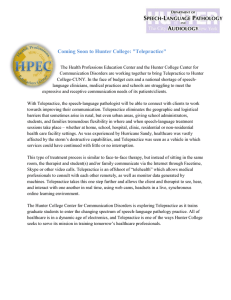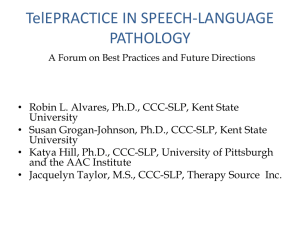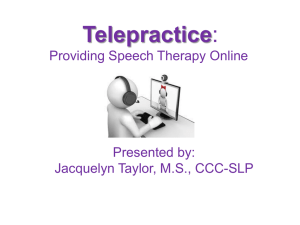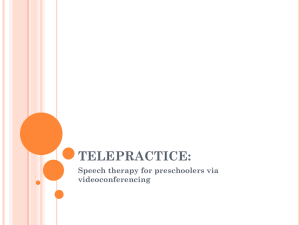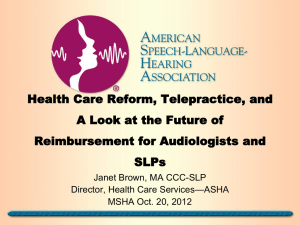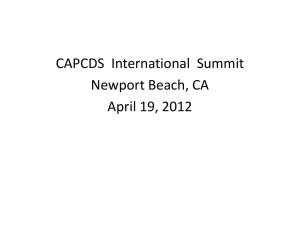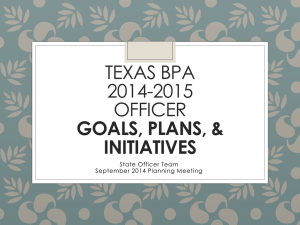Presentation - Listening and Spoken Language Knowledge Center
advertisement
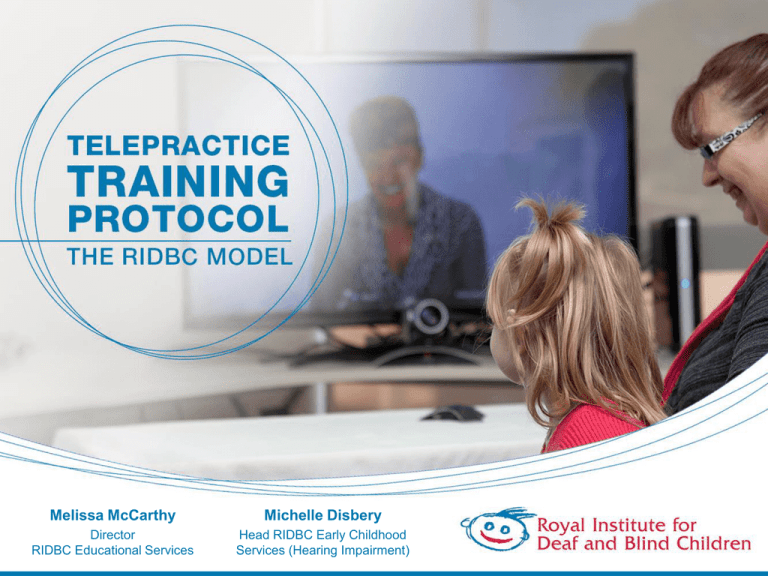
Melissa McCarthy Michelle Disbery Director RIDBC Educational Services Head RIDBC Early Childhood Services (Hearing Impairment) RIDBC services Educational Services Early intervention Preschools Schools School Support Service Teleschool Clinical Services Audiology Cochlear Implant Services Assessment Therapy Community Support By providing quality & innovative education & other services, RIDBC will achieve the best outcomes for current & future generations with hearing and/or vision loss throughout Australia RIDBC is Australia’s largest independent provider of services to children with diagnosed hearing or vision impairments RIDBC Staffing Wide range of professionals with additional qualifications and experience in sensory impairment Extensive continuing professional education through RIDBC Renwick Centre Early Childhood Teachers, Teachers of the Deaf, Teachers of Vision Impairment, LSLS Certified AVTs, Special Education Teachers Speech Pathologists, Audiologists, Occupational Therapists, Physiotherapists, Orthoptists and Access Technology Consultants Developmental Paediatrician, Educational and Clinical Psychologists, Social Worker Teachers Aides, Qualified Child Care Professionals RIDBC Teleschool • • • • • • Started in 2002 as small NSW program Received government grant in 2004 to expand to national program Delivers services on weekly basis to families and professionals via high definition two-way videoconference technology, Increased access to early intervention for regional and remote families Focused on developing methodology of telepractice from 2007 – 2011 Received government funding in 2012 to upgrade technology infrastructure and expand service provision Telepractice A methodology for remotely delivering a service to a client in a separate location via telecommunications/videoconferencing Synchronous components: – Videoconference sessions – Telephone contacts – Parent education sessions eg Hanen – Residential visits eg, intensive support, connecting to other families Asynchronous components: – – – – Educational packages email Ipad/iphone apps RIDBC and Me website/blogs/forums Training protocol TRAINING MODULES TRAINING METHODS Module 1: Basic technical training • • • • • Module 2: Telepractice procedures Module 3: Telepractice pedagogy Module 4: Advanced technical skills Lecture Printed materials Demonstration Practical activities Observation of live and recorded sessions • Supervised sessions • Group discussion Blended service • All the successes of Teleschool model applied to in-person sessions • All the successes of a traditional in-person model applied to Telepractice In-person sessions Telepractice sessions Blended service Asynchronous learning opportunities Audiological management/ CI services Aims to provide families with the best of both worlds while increasing access to regular, high quality early intervention RIDBC Hunter One of 5 dedicated RIDBC Early Intervention Sites Located in the NSW Lower Hunter Valley area Currently services 40 children aged 0-5 Accessed by many families living in the wider Hunter Valley area Staffing RIDBC Hunter employs: 5 Teachers of the Deaf 2 Teachers of Vision impairment 1 speech pathologist Service delivery challenges • Attendance – travel, sickness, additional disabilities, weather • Distance • Scheduling of appointments/ availability • Siblings/carers Staff experience • 5 Teachers of the Deaf • 2 Teachers of VI • 1 Speech pathologist Combined years of service at RIDBC Hunter = 91 years Initial staff survey results • 8 staff had never used videoconferencing or web based technology to deliver services to families • 2 staff had never used v/c or web based technology before • All 9 believed that we should be using technology to connect with families Module 1 Basic Technical Training Module 1 Topics: • • • • Types of technology Uses of technology Technical basics Equipment operation Module 1 Case Study RIDBC Hunter staff received: • 2 hour initial group training (lecture, printed materials) • 2x 1 hour follow up sessions, facilitated by technology consultant (demonstration, printed materials) • 4 independent training sessions (practical activities) Module 2 Telepractice procedures Module 2 Topics: • • • • Client selection Environmental assessment Resource selection Selection of assessments and interventions • Cultural and Linguistic variables Module 2 – Case study RIDBC Hunter staff received: • 2 hour group training (lecture, printed materials) • 30 minute environmental assessment • 2x multipoint observation sessions • Tour of resource library Module 3 Telepractice Pedagogy Module 3 Topics: • Adult learning styles/coaching strategies • Roles and responsibilities within sessions • Training and use of support personnel • Documentation of sessions • Evaluation Module 3 Case Study RIDBC Hunter staff received: • 2 hour training session (lecture, printed materials) • 2x 1 hour simulated VC sessions • 2x 1 hour session critiques Module 4 Advanced Technical Skills Module 4 Topics: • Asynchronous tools • Advanced functionality (multipoint, recording/streaming • Calibration and maintenance of telehealth equipment • Rules and Regulations regarding telepractice Module 4 Case study RIDBC Hunter staff received: • 2 hour training session (lecture, printed materials) • 4x 20min simulated troubleshooting activities • 2x 20min practical sessions integrating technology • 2x 30 min practical sessions integrating asynchronous technology (facilitated by multimedia staff) RIDBC Hunter 2014… - To date, all RIDBC Hunter staff have participated in service delivery via telepractice - 5 children have been enrolled in the telepractice (blended service) program. - 2 of these are also enrolled in the RIDBC Cochlear Implant program and participate in remote mapping via videoconference, facilitated by their consultant. Contact us Melissa McCarthy melissa.mccarthy@ridbc.org.au Phone +61 02 9872 0240 Michelle Disbery michelle.disbery@ridbc.org.au +61 02 9872 0217 Continuing Professional Education www.ridbc.org.au/renwick/professional-education
